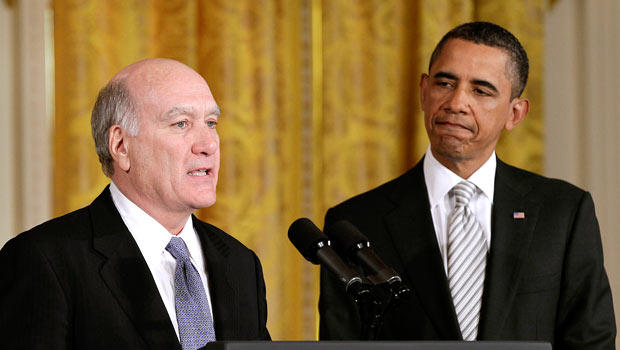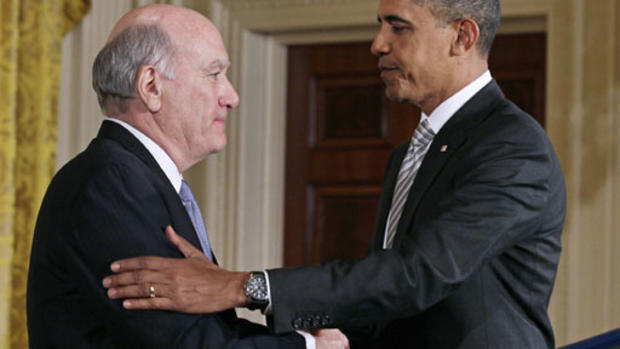White House Hits Back At Liberal Critics of Bill Daley
It's not hard to understand why liberals are confused and angry over the choice of Bill Daley to be White House Chief of Staff. The President Obama they know and love spent the last two years bashing Wall Street executives, calling them "fat cats" and lecturing them for their "greedy" ways.
Now, in a turn of events that has the left wing aghast, one of those fat cats will soon be setting policy at the White House. Daley, after all, spent 7 years at JP Morgan where he's believed to have earned at least $5 million a year, possibly much more. He's one of them, liberals cry, not one of us.
And it's not just Daley. Gene Sperling gets the nod today to replace Larry Summers as the top economic brain in the West Wing. For economic progressives it's like pouring salt in the wounds they're still nursing from the president's lame duck tax deal, in which the moderate deal-making Sperling played a key role.
A White House/Wall Street "Unholy Alliance?"
But in an interview in his large corner office in the West Wing, outgoing press secretary Robert Gibbs pushed back against the conventional wisdom that the president is suddenly moving to the political center, setting himself up for a re-election campaign that's focused on moderate voters, leaving liberals out in the cold.
The president, Gibbs said, "knows what his values are." During the health care debate, for example, some senior advisors argued for dramatically stripping it down, or even putting it off until after the economy recovered. Gibbs says the president listened - and then ignored their advice.
The implication is that the president will also ignore the fact that Bill Daley thinks the Democrats went too far on health care reform. And opposed Wall Street reform. Gibbs' basic message (resurrecting President Obama's car analogy from the campaign) is that the president's advisers can offer directions from the back seat, but the steering wheel is in the president's hands, and he knows where he's going.
As for Daley's background on Wall Street, Gibbs said that Daley's big role in the White House will not significantly change the president's position on business issues. (Critics will focus on the word "significantly" - a very large caveat.) I asked Gibbs if the president will still refer to Wall Street executives as "fat cats." "When it's appropriate" he responded. He also disputed the notion that the president is "anti-business."
But why bring in a Bill Daley if Mr. Obama isn't signaling a change in direction? Gibbs responded that liberals Robert Reich and Howard Dean support Daley. What the president gets in Bill Daley, he argued, is not a point of view, but someone with vast management experience in government and business, and someone respected on both sides of the aisle, essential in this new world of divided government. And, as the president said, Daley knows how to create jobs, the president's number one priority for the next two years.
Washington Unplugged: How Bill Daley Could Change the White House
These arguments will do little to calm the fears of the Democratic Party's left wing. To them, it's one more sign that the White House is confident that liberals will have nowhere else to turn to in 2012, and that once there's a Republican opponent, President Obama will look pretty good by comparison.
Critics will be watching Daley closely -- and they'll get plenty of opportunity to do that. Gibbs said he expects that once Daley settles in, he'll be a public face of the administration, making appearances on the Sunday talk shows.
As for Gibbs, I've never seen him look so relaxed. And it's no wonder given what he's escaping. He compared his job over the past two years to working in a submarine. As the door closes behind you before dawn, he said, it's like you hear the metal clang. The feeling of total immersion, he said, is like going a thousand feet under the ocean. Then 16 or 18 hours later, you surface and they en the hatch.
One day after announcing his departure, he was already feeling the tension drain from his body. His muscles, he said, are relaxing in a way they haven't in a very long time.
He plans to leave in about a month, making his living on the "mashed potato circuit" as President Reagan called it - where well-known people like Gibbs can earn stunning fees for giving speeches. For someone who's been on a campaign or government salary for so many years, it's going to be a bit like winning the lottery. There are reports that Gibbs will command something in the range of $20,000 to $30,000 a speech, maybe more.
And perhaps best of all, he won't have to deal with the often cranky, sometimes hostile, White House press corps. Most paid speeches are light-hearted affairs to a friendly audience. That's change Robert Gibbs can believe in.
Chip Reid is CBS News' chief White House correspondent. You can read more of his posts in Hotsheet here.


